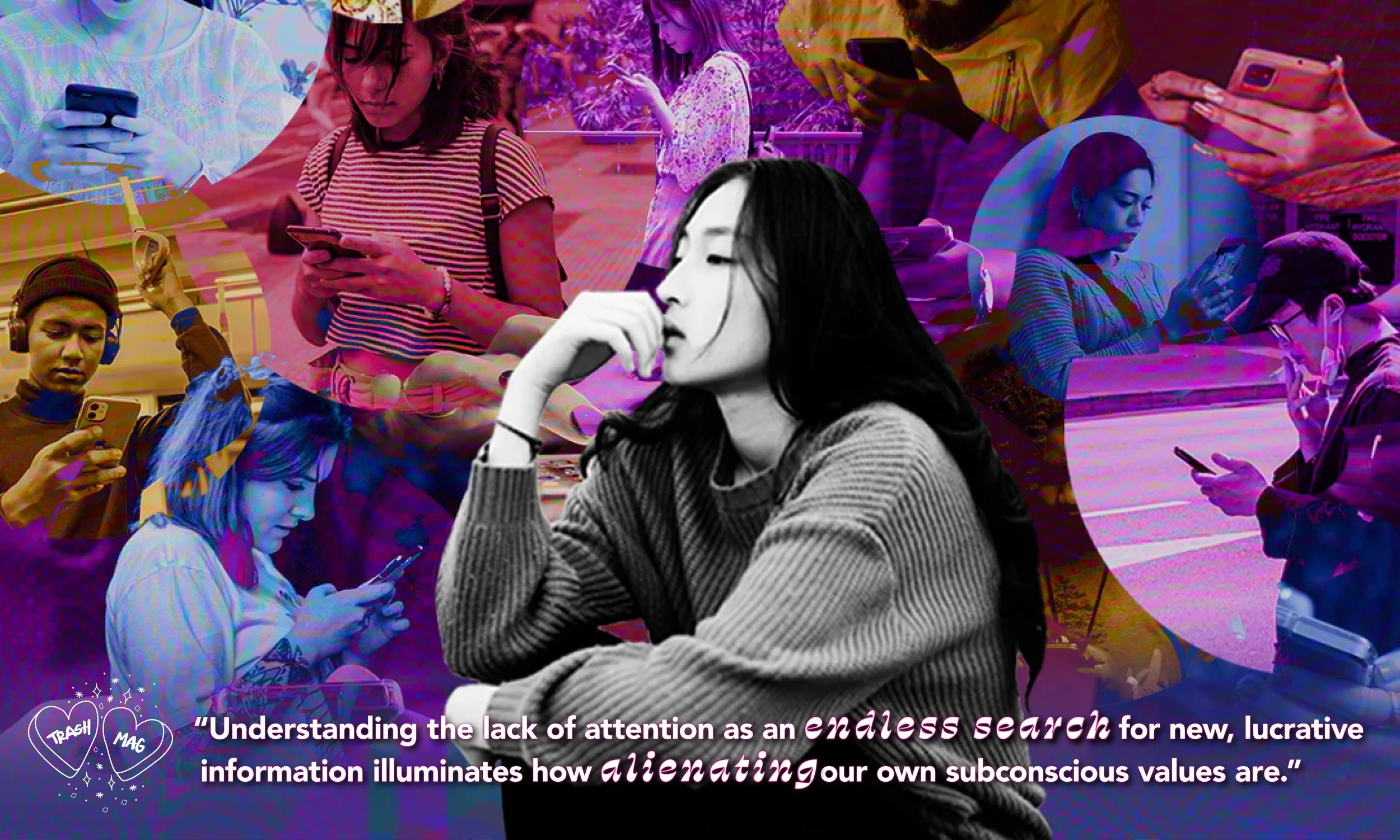When Life Doesn’t Engage Us
Graphics by Madison Vucci.
How often do you pick up your phone, despite the lack of notifications?
What about in the middle of a task?
Many of us feel that we can sense our attention spans worsening. In his Wired article “TikTok Wants Longer Videos—Whether You Like It or Not,” Chris Stokel-Walker writes that, “50 percent of users surveyed by TikTok said videos longer than a minute long were stressful; a third of users watched videos online at double speed.”
With the popularity of apps centered around short-form content like TikTok and Twitter, people are exposed to hundreds of different ideas daily.
A reported average usage of 95 minutes per day and the algorithmic promotion of videos under 30 seconds shows that users come across approximately 190 different videos on a daily basis. Similarly, Twitter users come across hundreds of tweets within a day, all under 30 characters.
Short-form content has quickly permeated into the mainstream, becoming the ubiquitous replacement for how we consume all of our information, be it news, pop culture, or entertainment. The very nature of these social media platforms championing short-form media has required that everything become entertainment to sustain your attention.
But why does a 60 second video make us squirm and scroll?
Why would we rather read someone’s extremely condensed summary of a book rather than reading it for ourselves?
Volume 5 of the research journal International Journal of Trend in Research and Development states in “Myth and Mystery of Shrinking Attention Span,” that “attention span is connected directly to the presence of mind necessary to sincerely engage in person-to-person interaction.” Our inability to sustain long-form media and our inability to maintain consistency in various aspects of our lives are linked by the claws of algorithmic entertainment.
The paper debunks the myth of the eight-second attention span. Dr. K. R. Subramanian explains that the reason younger audiences have what is often — inappropriately — labeled as a shortened attention span is not because of an uncontrollable inability to pay attention, but because the ever-present need to keep up with the new prevents them from committing to what they are seeing in the present.
This flurry of constant information leaves us looking for ways to stay relevant, always aspiring to the future and never the present.
Understanding the lack of attention as an endless search for new, lucrative information illuminates how alienating our own subconscious values are. Capitalist enterprise requires our alienation; we are no longer able to sit with content and are always searching for something new, our relationships with the world are not grounded in present-ness.
Every aspect of our lives has become an endless chase of what is new.
Even interpersonal relationships have taken on the form of short-form-based social media.
Dating apps like Tinder and Hinge have turned human relationships into an impersonal, estranged process of assessment. They mimic the algorithm used by short-form content apps that force us to rashly evaluate people and decide whether they’re worth our attention or whether we can find someone better and newer. This translates to long-standing relationships as well, because when people can no longer sit with the feeling of not knowing what’s new (under the premise that new is good), they can no longer commit to people without the looming fear and desire for the unknown.
This alienation of human relationships is not unique to dating apps either. Even Instagram has turned human presentation and perception into a short-form, digestible way to analyze people we don’t know.
We use Instagram to ‘curate’ ourselves, analyzing every little movement and its possible perception.
By extension, we do the same to everyone else. We chase the idea of a more improved, nonexistent, curated version of ourselves while we quickly judge other people through condensed, snapshots of their lives.
This shortened ability to build real connections with media turns platforms that were intended for connection into just another way to skim and scroll.
Capitalism leeches onto these platforms, and therefore us, encouraging engagement rooted in quantity, not quality.
We are alienated by not chasing new identities for ourselves, but we are even more alienated by trying to indulge in the manufactured FOMO, which we feel because we lack engagement in what isn’t ahead of the curve.
How can we resist a plague that starves and feeds us? How can we disengage from the status that causes our alienation? Our ungroundedness to our current state is caused by capitalism incarnated as platforms that feed off of our diversion from love and care. It is necessary that we are aware of how we cannot help the brutal and devastatingly alienating conditioning; but in tandem with that, we should actively prioritize a raw, healing connection with all of our relationships.
By building a foundation in things we truly feel engaged with, we will not feel as weighed down by self-perception and identity as a revolving status symbol, inherently making us feel more secure with not being or knowing what’s novel and trendy.
We have to learn to resist the emptiness of mindless modernity within both the online sphere and corporeal life by finding authentic practices of engagement.
